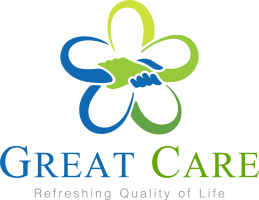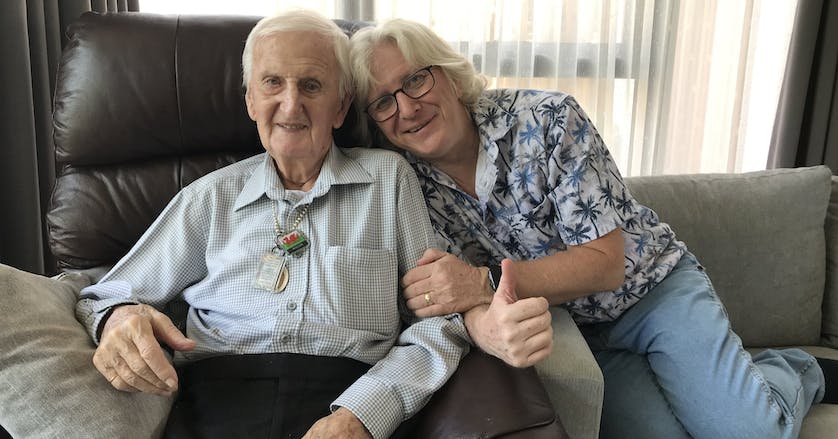I write this not only as a cathartic exercise but also because I know others might face a similar dilemma. My experience could help them deal with this burdensome position, and I make no apologies for the length. We have to talk about this stuff.
Placing my father in a care home was something I’d promised him I would never do. But I did. And in Thailand of all places for goodness sake. Not even in his beloved Wales! Was going against his wishes the best thing to do?
My answer to this question is a resounding “yes”. But it does depend upon which care home in Chiang Mai you choose, the individual’s needs and as ever, money.
The emotional turmoil leading up to making the decision affected all household members, including the dog. So let me give you a brief bit of background into what turned out to be my father’s end-game, and how for me, breaking my promise turned out to be the best for all of us.
At the end of 2019, with my then 98-year-old father still stubbornly living by himself in the UK, albeit in “managed” accommodation, I started to receive anxious phone calls from his care visitors and others. Remarkably fit and compos mentis until the middle of the year, he started being found lost and confused out and about in Hampshire. With the police bringing him home several times and the Social Services becoming involved, it was evident that something had to be done.
The diagnosis was dementia onset and designated as a vulnerable adult, no longer allowed to live on his own. The UK’s next step involved asset seizure to pay for care in a home. I learned that the next of kin, without a Lasting Power of Attorney in place, had no rights in this situation. (Note: get your LPOAs in place early!)
After lengthy discussions with the authorities and negotiations with “she who must be obeyed”, I brought my father back to Chiang Mai in early January 2020. Everyone agreed it was in his best interest, but we would start with a two-month trial period. I did feel that was optimistic (he was 98 after all), but that was the agreement with all parties.
With a live-in carer and some semblance of a routine, it wasn’t too bad at first. Yes, there were periods of total confusion, the 2am shouting and wandering around the house waking everyone, the anger at why it was happening to him, and that he wasn’t at home. But confident we could manage, I denied the realities of having a 98-year-old man in the house. Although I could see the strains on our family unit, I convinced myself that this was the right and responsible thing to do; it was just a matter of time before things would settle down.
They didn’t.
In mid-February, there was a step-function deterioration in his condition. Almost overnight, he no longer recognised me. He attacked a Grab driver because he thought he was being kidnapped. He would stand at the gate, waving a paper bag and shouting “help” at the top of his voice because he thought I was trying to murder him. He tried to hit the maid with his walking stick. A surprising turn of speed for a man his age.
Neither the carer nor I could deal with his increasing anger, and the situation started to get out of control. I did not know who this person was. It was certainly not my father.
My wife was often the target of the angry outbursts. She dealt with it with a stoicism I didn’t know she had, but it was clear it was wearing her down and the sleepless nights affecting her job. Yet, as a professional counselor, she seemed to be the only person who could get through and calm him. And briefly, there he was again, before falling back into the agitated state.
Several hospital visits provided a cocktail of drugs that knocked him out all day but affected his nighttime sleeping pattern. With our youngest daughter’s wedding to attend in Australia at the end of March, we had to find a solution. The thought of leaving him alone with the carer did not seem to be sensible to any of us.
In his more lucid moments, he was not fully aware of his “Dr. Jekyll and Mr. Hyde” like behaviour, but he knew he was in trouble. And that was so sad. The only thing we could think of was that while we went to the wedding, Dad had a two-week “holiday” in a care home. Even he thought it might be nice to have a change, before lapsing into a Mr. Hyde-esque tirade on my failings as a son.
So we started looking. I am not going to slag-off any particular location. But people with dementia or Alzheimer’s seemed to be second-class citizens in some places. An afterthought because they were “difficult to manage” and not the main focus. I can understand that but was appalled at the prospect of 24-hour-a-day drugs to keep him quiet, often in a locked room that seemed nothing more than a prison. My heart was sinking, and my guilt was building. This is my father, not an object!
And then, just when I was losing hope, we met Tanya and Sandy at “Great Care Home,” just South of Chiang Mai. Yes, their facilities were brand new, and I could have quite happily lived in the bright, modern bungalows with a plunge pool myself. But that had nothing to do with my decision. It was them.
Experienced geriatric nurses, their focus was to be purely Alzheimer’s, dementia, and other conditions that required 24-hour care. My father was on his best behaviour and even laughed and joked with them. He answered “yes” to the question of whether he would like to have a holiday there.
I explained the reality of my father’s deteriorating, drug-imbalanced condition, and asked lots of questions. They were competent, confident, and capable in their answers. I was sold. If Dad had to be somewhere while we were away, this was it.
The snag was they were not officially open until September. Now at the end of February, with our Australia visit end-March, my anxiety levels were high. After some discussion, which was more about me acknowledging that this would be like a “soft-opening,” they agreed to take Dad while we were away. They wanted him for a month minimum, which meant he would start his holiday the next day, and even Dad agreed.
I visited him every day and started to see a change in his behaviour. Sandy and Tanya had been consulting with Dr. Surat, a well-known neuroscientist here in Chiang Mai, as well as Great Care’s associated international nursing and geriatric consultants. They took Dad off the numerous drugs and tried a different, more balanced approach, which had almost immediate effects. I often found him sitting in his wheelchair watering the garden, or playing catch with BeeBee, definitely his favourite carer.
In the first week of March, Covid raised its ugly head and duly scuppered both our travel plans and the wedding. I went to inform Tanya and Sandy that I better take Dad home, resigned to the previous, heavily drugged, almost unmanageable situation. After all, I had promised Dad, and he did not want to be in a home.
Nobody was more surprised than me when he asked, “can I stay a bit longer? I like it here.”
Although worried about the financial side (who isn’t these days?), I agreed with a sense of relief. And then felt guilty about my reaction. But over the rest of March, that feeling started to change. Yes, he didn’t always recognise or remember me straight away; yes, he still became confused and sometimes angry. But he started singing, painting, playing games and developing a strange taste for country and western music.
Great Care’s motto is a “refreshing way of life.” I can only say that for my father, I saw that. Of course, his deterioration continued, but he seemed, well, happy, more relaxed. By the end of April, he was convinced that he owned the place, and he loved working in the garden. I received daily photographs, updates, and could visit whenever I wanted, often dangling my feet in the pool while Dad and I sat on the patio. There was no question that his quality of life had improved.
At the end of May, ironically following a hospital visit for a catheter check, Dad developed a chest infection. As is often the case for those of advanced years, this developed into pneumonia in his left lung. Sandy, Tanya, and BeeBee took turns to stay in his hospital room all the time he was there. Making sure he was well looked after and helping me by sharing the emotional burden of the situation.
I wasn’t there when he died. The day before, he seemed better, had responded to the treatment, and was eating again. He asked me to take a photo so he could see how he looked. “Not too bad,” he said, and I said goodbye until the next day when we expected him to be released. After a brief conversation with BeeBee at 5am, he went back to sleep and didn’t wake up.
Faced with WTF do I do now, the Great Care team helped me to organise everything. The death certificates, the coffin, the funeral, and the cremation; leading me through the intricacies of the local bureaucracy.
And then it was over. My father was dead, and I tried to reconcile the last six months and my feelings.
With the pandemic, there was no question Dad was better off here. Even though he was ill and sometimes I didn’t recognise the man I knew or vice-versa, we spent precious time together.
Did my plan to look after him in our house fail? Yes, it did. Do I consider myself a failure as a result? No, I don’t. However, I had certainly underestimated the realities of an ailing 98-year-old man with dementia in the house.
Do I feel guilty about breaking my promise to him? No, I don’t. Living with us wasn’t working, and that made everyone unhappy. Great Care provided an alternative that turned out to be the best decision for my father, me, my wife, and the dog.
His last few months were spent in a happier place, both figuratively and literally. The emotional burden of my father’s situation was shared and, as a result, reduced for everyone.
I told Sandy, Tanya, and BeeBee that I would tell everyone what they and the Great Care Home had done for my father. Because it is necessary and, sadly, something that many of us have had to and will face. Alzheimer’s and Dementia are an ongoing problem until some miracle cure appears, if ever.
The secret to me is to find the right care home for your loved one. I know everyone’s situation is different, but Great Care did precisely what they said they would do on the tin. They gave my father (and me, my wife and the dog) great care and a refreshing quality of life.
I am happy to tell everyone about that, and I’m sure my father is waving his walking stick from on-high in agreement. If you are in a similar situation, I recommend giving Tanya and Sandy a call. It could be the best decision for everyone.

Tel. +66 65-472-6633
Open Hours
Open daily 24 hours.
E-mail : Info@greatcarehome.com

